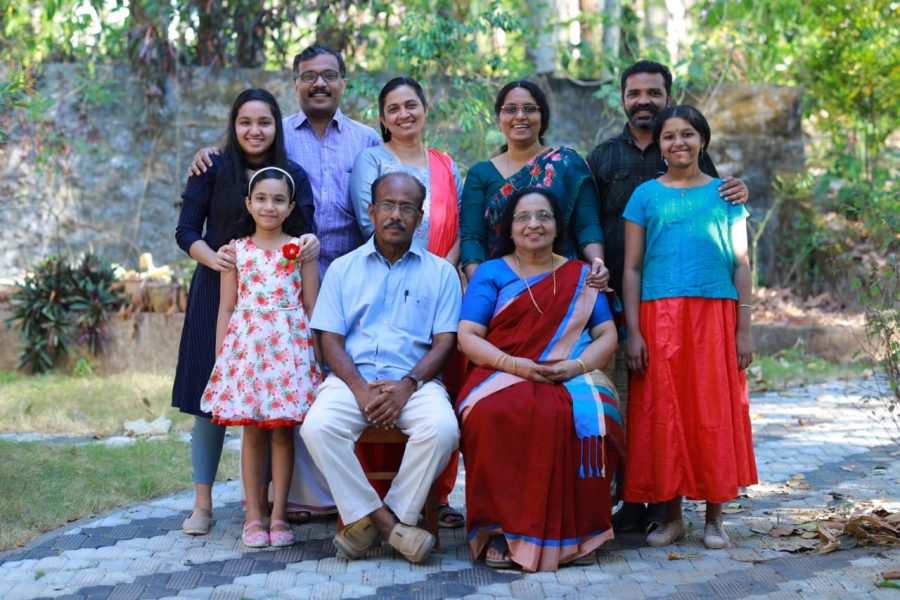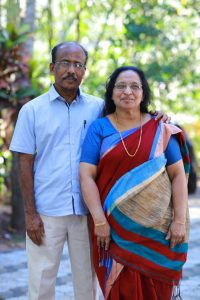
Being Casteless: A Kerala couple’s 3-generation tryst with shunning religion
There is no room for religion, caste or ‘love jihad’ in the nearly 50-year marriage of Fasuluddin and Agnes

In this age of caste- and religion-led hate and animosity, where ‘love jihad’ and ‘narcotics jihad’ are commonplace utterances, a family in Kerala stands like an oasis, offering hope for humanity. The ‘Casteless House’ of Kallumala near Punalur, in Kerala’s Kollam district, is now in its third generation.
It all began around 50 years ago when Fasuluddin, now 72, fell in love with his Christian neighbour — a social shocker way back in the 1970s. When Fasuluddin and Agnes decided to marry in 1973, there were religious impediments that they had to overcome. They did it with enormous will power and went on to groom two generations with rationalist beliefs.
Against all odds
Fasuluddin, an automobile engineering diploma holder, was engaged in taking up transport contracts for the Food Corporation of India (FCI). When the respective families heard about his romance with Agnes, there was much fuss, and Agnes was placed under ‘house arrest’.
Also read: Are books a security threat? Kerala prison’s order whips up a row
Fasuluddin moved the Kerala High Court with a habeas corpus petition, and the court granted a writ on October 29, 1973. Justice Sadasivan and Y Khalid, who heard the petition, asked whether the couple would like to marry, and told the parents they cannot force their daughter to be homebound.
“Her parents brought her to the court and thereafter we lived together. Both the families were wary of our relationship in the beginning. Much of the resistance came from the Jamath (an Islamic council), in which I was a member,” said Fasuluddin, recalling his union with his wife nearly half a century ago. The Jamath authorities issued circulars asking members not to visit their house, and Fasuluddin was ousted from the Jamath. “They asked my relatives not to visit me, and for at least three years none of my relatives visited me. However, we decided to pull on, hoping for the best,” he said.
Amid all the animosity to his relationship with Agnes, there was never a love jihad allegation, and the preponderant protest sprang from his own community, said Fasuluddin. The Jamath committee summoned him and asked him to convert Agnes to Islam, he recalled. “I was reluctant to convert anyone. In fact, we sustained fulminations from the community for our decision. This pained us and we decided to sever our ties with religion, desisting from attending church anymore. I was a believer and so was Agnes. She had even resolved to join a nunnery in protest for not being allowed to marry,” he said.
Saying no to religious rituals
“After these harsh experiences and as a result of mental conditioning after reading the works of (rationalist-author) AT Kovoor, we decided to sever our ties with the Church and decided to be cut off from religious rituals,” he said.
Also read: Meet TN’s first differently-abled politician to head a party’s district unit
Fasuluddin further recalled that stones were hurled at his house as a result of the protests and there were apprehensions that they would be physically attacked. In hindsight, he said, he could understand the concerns of the Jamath — the members feared one among them was going astray, and took it on themselves to correct him.
Recounting her experience, Agnes said: “Since then I never visited a church for prayer or participated in rituals. However, later on, when some relatives died or when we were invited to weddings, we used to visit the church. However, the religiosity in us faded forever.”

There were attempts from the clergy to persuade them to come to the church, she said. Fasuludddin recalled that since she was aware of the calumny against them at the time of their marriage, she never asked him if she could attend church. “And I never encouraged her, either,” he said. “Ever since then, I’ve never thought about visiting church for religious purposes. We thought that instead of practising religion one should live well,” said Agnes.
Names sans caste or religion
Their distrust of religious symbols was perpetuated in their children as well. As a mark of their protest against caste and religion-based divides, they named their elder son ‘Casteless’. “When he was admitted to school, we filled the religion column with ‘nil’,” recalled the parents. “We never trained them to be adherents of any religion.” The second son was named ‘Casteless Junior’. Their third child, a girl, was named ‘Shine’.
“At the time of marriage also they dismissed religious factors,” recalled Agnes. Casteless is married to Sabitha, who is again the product of an inter-religious marriage — her father is a Muslim and her mother, a Christian. Casteless Junior (a CPI municipal councillor and former municipal vice-chairman) is married to his college-mate Rajalakshmi. Shine is married to Che Guevara, a 3D designer and the son of atheist Muslim parents. The three marriages were held under the provisions of the Special Marriage Act.
Also read: Why everyone wants to appropriate Thiruvalluvar
The grandchildren, too, were given non-religious names. Casteless’s daughter is Alpha Casteless, and his son, Indian Casteless. Casteless Junior’s daughters are Alpha Casteless Junior and Agna Casteless Junior. Shine’s daughter is Alida Che Guevara. Alpha, Agna and Alida are students at Toc H Public School, Punalur. All the grandchildren were groomed without any religious sentiments.
Not missing religion
“They (his parents) were isolated after marriage with a small group of friends morally supporting them,” recalled Casteless Junior. He added that he and his siblings did not face any problems in not practising any religion. In fact, they were proud of their parents’ decision to not follow any religion, he added.
Fasuluddin reflected that none of his children or grandchildren had any soft corner for any religion and could see all people bereft of religious angles. “I myself may have a tinge of religiousness inside me since I was born a Muslim and practised it for some period, but I can assure that none among my children or grandchildren have that feeling due to their non-religious upbringing. They all see every individual as a human being,” he said.
Reflecting on the love jihad controversy, Fasuluddin said it is highly unlikely that people would go for inter-religious marriages for any ulterior motive, including to increase the numerical strength of a community. “In the context of North India, I cannot say. But in Kerala, such an incident never happens,” he emphasised.
“If someone thinks along those lines it is totally wrong. There is no point to this controversy other than creating communal issues.”
A happy third-gen
Indian Casteless, the son of Casteless and a third-generation member of the family, shares his parents’ and grandparents’ sentiments. “Like my name, I desire that India, my country, should also become casteless,” he said.
His name is rather special, and he knows it. “All are curious when they hear the name ‘Indian Casteless’. Many would befriend me,” said Indian, who is a student of the Indian School, Al Ain, UAE.


